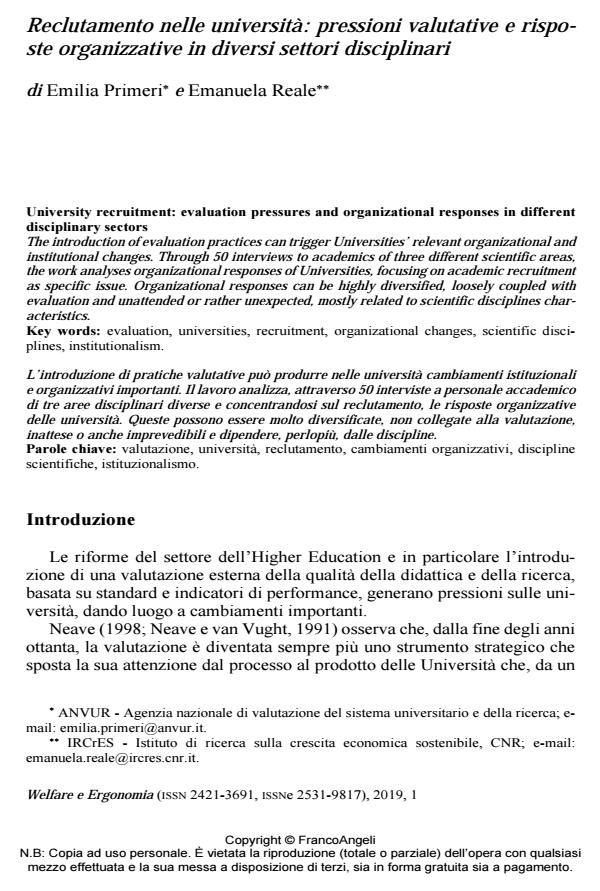University recruitment: evaluation pressures and organizational responses in different disciplinary sectors
Journal title WELFARE E ERGONOMIA
Author/s Emilia Primeri, Emanuela Reale
Publishing Year 2020 Issue 2019/1
Language Italian Pages 15 P. 95-109 File size 212 KB
DOI 10.3280/WE2019-001009
DOI is like a bar code for intellectual property: to have more infomation
click here
Below, you can see the article first page
If you want to buy this article in PDF format, you can do it, following the instructions to buy download credits

FrancoAngeli is member of Publishers International Linking Association, Inc (PILA), a not-for-profit association which run the CrossRef service enabling links to and from online scholarly content.
The introduction of evaluation practices can trigger Universities’ relevant organizational and institutional changes. Through 50 interviews to academics of three different scientific areas, the work analyses organizational responses of Universities, focusing on academic recruit-ment as specific issue. Organizational responses can be highly diversified, loosely coupled with evaluation and unattended or rather unexpected, mostly related to scientific disciplines characteristics.
Keywords: Evaluation, universities, recruitment, organizational changes, scientific disciplines, institutionalism.
- Becher T. (1989). Academic tribes and territories: Intellectual inquiry and the culture of the disciplines. Bristol, PA: Open University Press.
- Bleiklie I. and Kogan M. (2007). Organization and governance of universities. Higher Education Policy, 20: 477-493.
- Bonaccorsi A. (2007). Explaining poor performance of European science: institutions versus policies. Science and Public Policy, 34(5): 303-316, DOI: 10.3152/030234207X229411
- Clark B.R. (1986). The higher education system: Academic organization in cross-national perspective. Berkeley and Los Angeles: University of California Press.
- Clemens B.W and Douglas T.J. (2004). Understanding Strategic Responses to Institutional Pressures. Journal of Business Research, 58(9):1205-1213.
- Deem R., Hillyard S. and Reed M. (2007). Knowledge, Higher Education, and the New Managerialism: The Changing Management of UK Universities. Oxford: OUP.
- DiMaggio P.J. and Powell W.W. (1983). The Iron cage revised: institutional isomorphism and collective rationality in organizational fields. American Sociological Review, 48: 147-160.
- Enders J. (2004). Higher education, internationalisation, and the nation-state: Recent developments and challenges to governance theory. Higher education, 47(3): pp 361-382. DOI: 10.1023/B:HIGH.0000016461.98676.30
- Gornitzka A. (1999). Governmental policies and organisational changes in higher education. Higher Education, 38: 5-31. DOI: 10.1023/A:100370321
- Gueissaz A. and Häyrinen-Alestalo M. (1999). How to integrate contradictory aims: the configurations of actors in the evaluation of universities. European Journal of Education, 34(3), 283-297.
- Hazelkorn E. (2013). How Rankings are Reshaping Higher Education. In: Climent V., Michavila F. and Ripolles M., editors, Los Rankings Univeritarios: Mitos y Realidades. Ed. Tecnos.
- Henkel M. (2005). Academic identity and autonomy in a changing policy environment. Higher Education, 49(1-2): 155-176.
- Lascoumes P. and Le Gales P. (2007). Understanding Public Policy through its Instruments – From the Nature of Instruments to the Sociology of Public Policy Instrumentation. Governance: an International Journal of Policy, Administration and Institutions, 20(1): 1-21.
- Leisyte L. and Dee J. (2012). Changing Academic Practices and Identities in Europe and the US Critical Perspectives. In: Bastedo M., Higher Education: Handbook of Theory and Research. Dordrecht: Springer.
- March J.G. and Olsen J.P. (1984). The New Institutionalism: Organizational Factors in Political Life. American Political Science Review, 78(8): 734-49.
- March J.G. and Olsen J.P. (1998). The Institutional Dynamics of International Political Orders. International Organization, 52(4):943-969.
- Margison S. and van der Wende M. (2007). To Rank or To Be Ranked: The Impact of Global Rankings in Higher Education. Journal of Studies in International Education, (11)3/4: 306-329.
- Meyer H.-D. and Rowan B., editors (2006). The New Institutionalism in Education. State University of New York Press.
- Miles M.B. and Huberman A.M. (1994). Qualitative Data Analysis (2nd edition). Thousand Oaks, CA: Sage Publications.
- Miller H.T. and Fox C.J. (2001). The Epistemic Community. Administration & Society, 32(6): 668-685. DOI: 10.1177/00953990122019613
- Musselin C. (1994). L’Etat et la profession universitaire en France et en Allemagne. In: Politiques et management public, 12(2). Administrer les savoirs: leur production, leur transmission, leur application, leur contrôle – Actes du Sixième Colloque International, Genève – 25/26 mars 1993. pp. 151-173.
- Neave G. (1998). The Evaluative State Reconsidered. European Journal of Education, 33(3): 265-284.
- Neave G. and van Vught F.A., editors (1991). Prometheus Bound. The Changing Relationship Between Government and Higher Education in Europe. Oxford: Pergamon.
- Oliver C. (1991). Strategic responses to institutional processes. Academy of Management Review, 16(1): 145-179.
- Paradeise C., Reale E., Bleiklie I. and Ferlie E., editors (2009). University Governance. Western European Comparative Perspectives. Springer.
- Progetto PREST-ENCE. From prestige to excellence – ANR (FR) (2013).
- Reale E. and Potì B. (2009). Italy: Local policy legacy and moving to an ‘in between’ configuration. In: Paradeise C., Reale E., Bleiklie I. and Ferlie E., editors, University Governance. Western European Comparative Perspectives. Springer, pp. 77-102.
- Reale E. and Primeri E. (2014). Reforming Universities in Italy. Towards a new Paradigm? In: Musselin C. and Teixeira P.N., editors, Reforming Higher Education: Public Policy Design and Implementation, Higher Education Dynamics, pp. 39-63.
- Reale E. and Seeber M. (2011). Organisation response to institutional pressures in Higher Education: the important role of the disciplines. Higher Education, 61(1): 1-22.
- Scott W. R. (2008). Approaching adulthood: the maturing of institutional theory. Theory and Society, 37(427).
- Seeber M. (2010). Steering heterogeneous sciences in the Dutch and Italian higher education systems. Working paper CERIS-CNR, Vol. 4.
- Teichler U. and Cummings W.K. (2015). Forming, Recruiting and Managing the Academic Profession. A Varied Scene, in Forming, Recruiting and Managing the Academic Profession. Dordrecht: Springer.
- Whitley R. (2000). The intellectual and social organization of the science. Oxford: Oxford University Press.
- Whitley R. and Gläser J. (2007). The Changing Governance of the Sciences. The Advent of Research Evaluation Systems. Sociology of the Sciences Yearbook, Vol. 26. Dordrecht: Springer.
Emilia Primeri, Emanuela Reale, Reclutamento nelle università: pressioni valutative e risposte organizzative in diversi settori disciplinari in "WELFARE E ERGONOMIA" 1/2019, pp 95-109, DOI: 10.3280/WE2019-001009